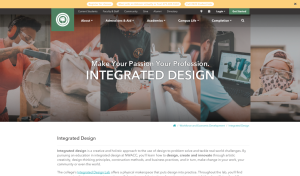Integrating Interdisciplinary Design Thinking: Developing High Demand Workforce Skills at the Intersection of Art and Industry

This project aims to serve the national interest by expanding the skilled technical workforce, especially in construction fields and engineering design. To accomplish this goal, the project will create a Technical Certificate in Integrated Design. This certificate will stack into several two-year degrees, including Associate of Applied Science degrees in Construction Technology and in Computer-aided Design. Curricula and educational resources for an Integrated Design Lab will be developed to support the certificate. This lab will provide students with an interdisciplinary, hands-on learning environment in which they can learn and practice design thinking. Design thinking activities will also be integrated into workforce-directed programs such as CAD, construction, 2D/3D design, and arts. These additions will help students develop the design-related skills that are in high demand in engineering, graphic design, and fine arts. The project aims to serve a diverse student population that includes incumbent workers and high school students, including those from groups that are traditionally under-served. In this way, the project aims to help meet the need for a diverse and creative STEM national workforce.
The goal of the project is to develop pathways for high school students, college students, and incumbent workers to learn design thinking as part of their STEM education. The project has three objectives. First, the project seeks to create a market-driven and competency-based curriculum in design thinking. Second, it will provide an interdisciplinary and experiential learning environment focused on design thinking and make the environment available to students and the community. Third, the project will establish Northwest Arkansas Community College as a technical and logistical hub for regional coordination, planning, and workforce training and produce certified students to fill workforce needs in local industry. Students in the program will develop Professional Portfolios to help them get jobs and develop careers. A portion of the curriculum will be designed for the incumbent workforce, as well as for portability and transferabilty. Articulation agreements will extend post-secondary partnerships with regional four-year programs in industrial automation and design. Specialized equipment will support hands-on fabrication and production of functional products. The project builds upon previous NSF-funded work that explored the inclusion of design thinking and fabrication resources in the formation of design skills in baccalaureate engineering and graduate programs. This project will extend that research with the inclusion of interdisciplinary elements utilizing design aesthetic and workforce-ready fabrication skills in associate degree programs. The project will additionally benefit the community through specialized workforce training and workshops for a general audience.
About

Comments